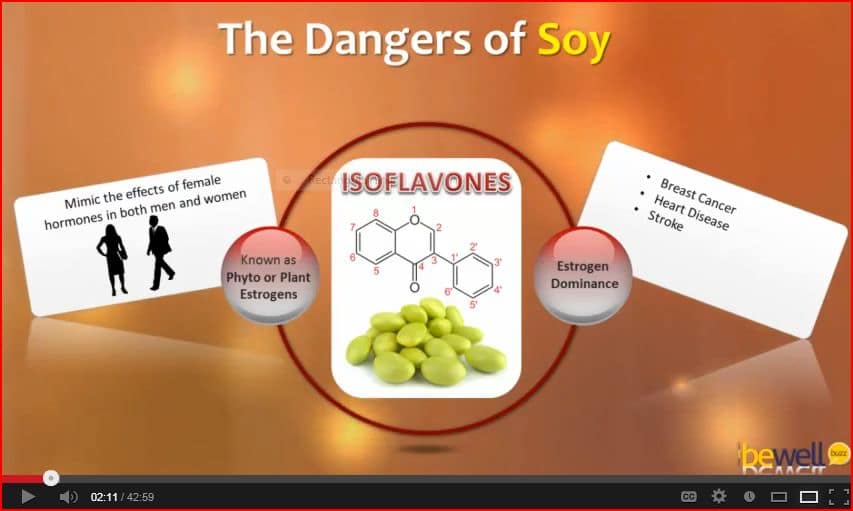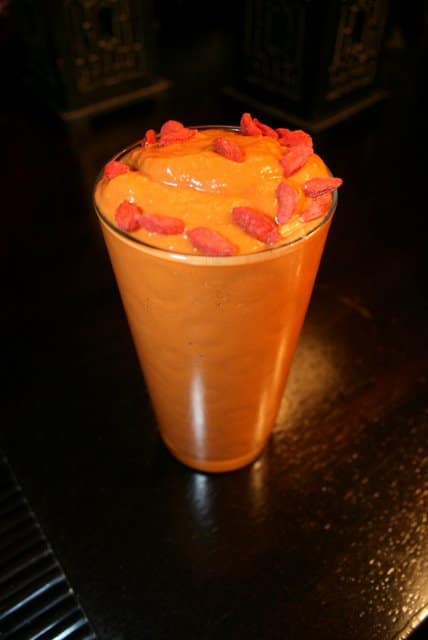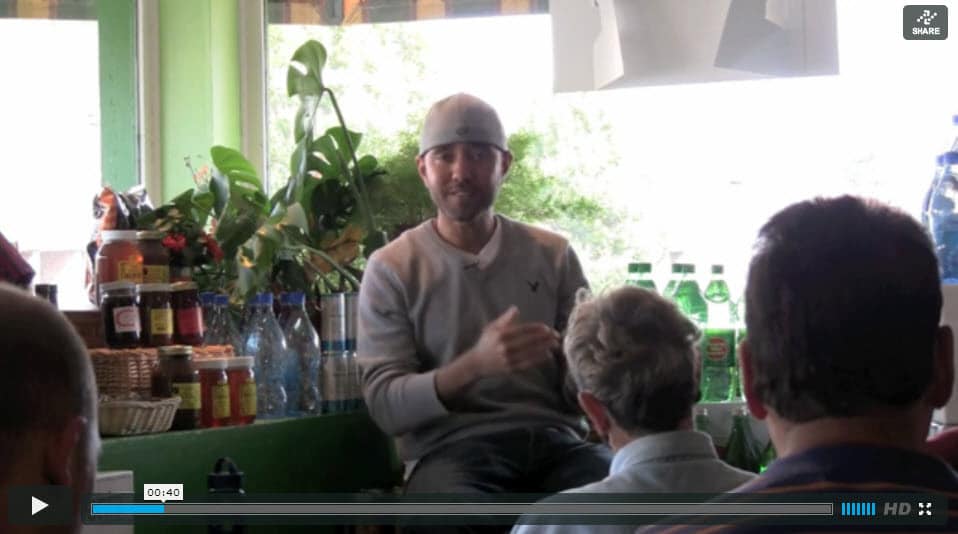Hi, I’m Shawn, and I’m a recovering soyaholic (don’t judge me).
At Thanksgiving my family would gather together around the table, ready to carve into our very odd looking Tofurky.
I told myself that it tasted much better than it did, and powered my way through that heavily processed mound of angry soy meat.
It was quite an experience, I’ll tell you that.
Besides the holidays, I’d regularly consume soy milk, soy deli meat slices, soy sausage, tofu (in everything from wraps to stir fry), soy cheese, soy protein powder, soy protein bars, and more. Yes, I had a bit of an issue… and I’m mature enough to admit that now 🙂
Because of the perspective I had at the time, and being so enthusiastic about soy, I probably wouldn’t have listened if someone would’ve tried to “educate” me about its potential dangers.
Whenever we’re passionate about something, we tend only look for things that support our belief, and automatically turn a blind eye to those things that go against it. Many of us will take it a step further and actually ATTACK other people that don’t agree with our beliefs.
They say that all truth goes through 3 distinct phases: First, it is ridiculed. Second, it is violently opposed. Third, it is accepted as being self-evident.
I bring this up because the discussion regarding the dangers of soy products can often become a heated one. It’s incredibly valuable to have a heartfelt opinion, but it is quite another to ignore the facts because you’ve already made up your mind about something.
The above video that I did with Be Well Buzz will show you, conclusively, that not only are the dangers of soy real, but they are potentially life threatening.
And If you think that you are not eating soy, then think again. Soy protein, soy flour, and dozens of other soy products are routinely added to foods that unsuspecting customers are buying everyday.
Some people might say, “Well, I don’t believe what this very attractive expert is saying 🙂 I’m going to go right ahead and keep eating my soy… I haven’t had any problems. People have been eating lots of soy in Asia for years, and you see how healthy they are!”
First of all, people in Asia have not been consuming soy like you’ve been led to believe. The research and real life surveys of people from that part of the world tell us that soy has NEVER been a large part of their diet. It’s seen more like a condiment or an accessory to a meal when it’s used on occasion… Definitely not the glasses of soy milk, soy burgers, and soy ice cream that people are hammering down today.
Secondly, soy isoflavones and other potentially dangerous compounds found in soy are going to affect people differently. Yes, you might not have any noticeable symptoms yet, but the scariest part of the research is that the soy foods you’re consuming will likely damage your children much more than they will you.
In the video I site research showing that 2nd and 3rd generations given soy were progressively becoming infertile. We’re talking about the inability to reproduce, increased mortality, and chronic disease as a result of eating this new wave of soy foods. This has now become a serious issue, and this conversation definitely needs to be had.
Our ancestors knew that the actions we take now, how we take care of ourselves and take care of the planet, would heavily impact the well being of future generations.
Many of us seem to have forgotten about that.
So many people act in a selfish manner, and ignore the effects that their actions are going to have on their children, grandchildren, and beyond.
This is a call to action to get educated on this right now! Not just for our own health, but for the health and well being of future generations.
The actions we take today are that powerful, so enjoy the video, and make sure to share it with everybody you know.
So, what’s your take on soy foods? Do you feel that soy benefits outweigh the dangers of soy? Are you a recovering soyaholic like me? I’d love to hear about it, so leave me a comment below.








Hi Shawn,
Considering that studies have rejected all these claims about soy. I’m curious if you have changed your opinion about soy too.
Hello Shawn,
I’m a fan of your podcast. I’m listening to it chronologically, which means I’ve heard your episode about soy from 2013 in year 2020.
Do you still believe the soy shouldn’t be eaten?
I told my friend about your opinion and he argued that the current studies reject the estrogen complaint and said that soy is ok.
Furthermore, he pointed to studies saying that if humanity wouldn’t eat meat, we’d get rid of more of the diseases we have today. He chooses soy over meat and only now trying to be a vegan.
What do you think?
Hi Dominik, this is Craig the resident nutritionist here. There’s a lot of controversy over soy, for sure. Evolutionarily speaking, we wouldn’t have had large access to soy every day. It’s not something that we have adapted to eating on a consistent basis. Whereas meat was something we had very available and there’s a lot of anthropological evidence that shows humans ate meat for a large part of humanity. Scientifically speaking now, the DIAAS score (how bioavailable protein is) shows that meat is much more bioavailable in our bodies and we absorbed more of it than soy. The science that shows the isoflavonoids in soy are estrogenic are highly debated, but there’s truly nothing in soy that we need that we can’t get elsewhere. Anybody that says that meat is bad for health is always pointing to epidemiology studies (that can only show correlation). There’s no mechanistic data to support the claim that well-raised meat is bad for human health. Often people eat meat with other unhealthy habits like lack of exercising, smoking, processed carbs, high sugar, oxidized vegetable oils, etc. When you start living a healthy life and doing a lot of these other factors right (move more, sleep better, lower stress, etc.), meat is completely fine. And is a source of so many micronutrients that we need to function optimally. Vitamin A is found in liver in its most bioavailabe form (retinol). 95% of people can’t convert plant vitamin A (beta carotene) to usable vitamin A (retinol). There’s so many vitamins and minerals just like this. Not to mention that following a meatless diet in the longterm can contain many pitfalls, with nutrient deficiencies. People often feel great just starting out a vegetarian and vegan diet for months and a few years, but that’s largely because they are adopting other healthful habits as well and excluding a lot of processed foods. Obviously anyone will feel better doing this. But long term, no culture has ever been shown to thrive not eating meat. Then there’s the sustainability discussion. I’d highly recommend reading the book Sacred Cow to learn more about this topic! Well raised animals are part of the solution when it comes to climate change, not the issue. Hope this helps!!
Hey everyone.
First off I’m a huge fan of the podcast. Love it and thanks for all you do.
Now, I’ve recently gone plant based in my nutrition to switch things up a bit, I’ve been doing it for 3 weeks and I’m not going to lie, I’m liking it. I feel much better.
Would you consider meat safer then say tofu?
If I were to stop eating tofu would you recommend another source of protein ? Seitan ?
Thanks again for all your help.
Hey Jason! Awesome to hear (: And to answer your question, it depends. I’ll just give you the pros and cons of each side. Ideally tofu can be very problematic for several reasons that may still be controversial in the health realm, especially to those who are avid herbivores. Tofu is a curdled soy product (much like that when milk is made into cheese). Many people believe this product to be healthy because it’s low in fat, calories, yet high in amino acids, iron, and some calcium. Yet, soy especially has been shown in studies to be genetically modified (monsanto), contain phytoestrogens, contain antinutrients (lectins, phytates, and oxalates which inhibit the calcium absorption), disrupt the thyroid gland, lead to B12 and vitamin D deficiences, and potential heart problems. Not to scare anyone away from tofu, but it can be problematic for a lot of individuals. Switching to meats, they can also be problematic or a health food depending on the source. As long as you’re sourcing meats from a pure grass-fed/grass finished, pasture raised animal from sustainable sources then meat can be a health food. However, if the meat being consumed is from an animal that ate grains, soy, and corn (not it’s natural diet), and was pumped full of hormones to “beef” it up, then the individual will also be consuming those contents as well. Hope this helps! Keep up your health journey(:
Dear Shawn,
I would like to express my deepest gratitude towards you.
You’re truly making a difference in people’s life.
As a response to your article, I would like to propose an idea:
What we can prove is what matters most, because the weight of an argument rests on its evidence.
This brings me to my concern: the article has no cited references. And, there are many peer reviewed studies that show the opposite of your arguments (the references below are a case in point).
For instance, the negative effects of soy are shown when participants were given 15 servings a day. That amounts to 7 cups of tofu per day! But, when participants were given 2 servings per day, no negative effects were shown.
My point being that people don’t usually eat 7 cups (or more) of tofu every day, so the article should specify what amount has negative effects.
Your fan,
Bryan
Sources:
• Shu XO, Zheng Y, Cai H, Gu K, Chen Z, Zheng W, Lu W. Soy Food Intake and Breast Cancer Survival. JAMA. 2009 Dec 9;302(22):2437-43.
• Wu AH, Yu MC, Tseng CC, Pike MC. Epidemiology of soy exposures and breast cancer risk. Br J Cancer. 2008 Jan 15;98(1):9-14.
• Nagata C, Shimizu H, Takami R, Hayashi M, Takeda N, Yasuda K. Dietary soy and fats in relation to serum insulin-like growth factor-1 and insulin-like growth factor-binding protein-3 levels in premenopausal Japanese women. Nutr Cancer. 2003;45(2):185-9.
• Dewell A, Weidner G, Sumner MD, Barnard RJ, Marlin RO, Daubenmier JJ, Chi C, Carroll PR, Ornish D. Relationship of dietary protein and soy isoflavones to serum IGF-1 and IGF binding proteins in the Prostate Cancer Lifestyle Trial. Nutr Cancer. 2007;58(1):35-42.
• Arjmandi BH, Khalil DA, Smith BJ, Lucas EA, Juma S, Payton ME, Wild RA. Soy Protein Has a Greater Effect on Bone in Postmenopausal Women Not on Hormone Replacement Therapy, as Evidenced by Reducing Bone Resorption and Urinary Calcium Excretion. J Clin Endocrinol Metab. 2003 Mar;88(3):1048-54.
• Maskarinec G, Takata Y, Murphy SP, Franke AA, Kaaks R. Insulin-like growth factor-1 and binding protein-3 in a 2-year soya intervention among premenopausal women. Br J Nutr. 2005 Sep;94(3):362-7.
Hi Shawn I came across this website where the Hufftington Post says soy is good for you. I remember in one of your podcasts you invited Arianna Hufftington as a speaker. I’m a little confused.
What about edamame? It’s not broken into any other form. Is this still horrible? And also, you didn’t answer one of the questions above about sprouted tofu. Should I be staying away from that too? Thank you for your wisdom and generosity with your knowledge. Bits been helping me in ways you can’t imagine
Hi Shawn,
I so have appreciated all your podcasts immensely ….this was specially good to hear since my daughter has consumed soy since she was an infant and now is a vegan so getting enough protein is a challenge for her and I have taken notes and e-mailed her the info… As a Health and nutrient conscious Pharmacist I always approached what most people would consider unorthodox approaches to health, but you’ve proven scientifically how beneficial your research has helped many. Keep up this great work, I’ll be listening!!!
With warmest regards,
Jeannette Somers
Thank you Shawn. I was mesmerized by this information. I could not stop listening. I was never very big on soy but now it will definitely not be a part of my diet.
You are more than welcome, Doris. 🙂
Hey Shawn,
thanks for the heads up. I appreciate the insight on the 3 stages of truth; interesting.
I am too concerned with the nature of the affects of the food that is considered safe. Soy is a very cheap, industrially produced product that has been heavily modified to meet economic interests, and implemented into many aspects of our nutrition.
While I was never a soy-addict, I was briefly consuming beans and powder regularly, and still eat tofu rarely, though that is likely to cease altogether.
In addition to the dangers of Soy, exist the dangers of pesticides and hormones both in regular produce, and meat. It has been proven that any pesticides mimic estrogen at levels 1000’s of times more powerful ( I think) than plant estrogens. It has also been shown that steroids given to animals carry through into our own bodies when consumed, and can mimic estrogen. These realities are particularly dangerous to young fertile people, like you have stated.
I hope everyone washes their vegetables very well, and eats organic meats and produce when possible.
thanks Shawn
While I’m not a soyaholic, I have consumed a considerable amount of soy over my lifetime. I’m allergic to milk, so as an alternative to dairy milk, I drink soy milk a couple times a day. I eat everything else normally, but can drinking soy milk give me the same harmful effects even though my diet includes plenty of normal foods?
Hi Shawn,
Just want to Thank You for the amazing work that you do. I so appreciate your knowledge, your commitment, your passion and your sense of humour.I look forward to hearing your voice as often as I can.
Merci beaucoup.
Some health companies are promoting soy protein powders that use non-gmo, fermented soy. Is the quantity still a concern if the quality is adjusted?
That’s a good question, Jennifer. I’ve noticed over the last year or so that more companies are announcing that they don’t use GMO soy. That is a positive step for the sake of not endorsing GMOs and not experimenting with unnatural food manufacturing. Yet, as someone who’s interesting in being the healthiest person possible, the same potentially negative effects of soy still apply. There are just so many better things to go for than soy. Whole food proteins first. Protein powders fro hemp, pea, and/or egg would be ideal if taking a vegetarian approach. And, of course, super-dense protein foods like spirulina – https://themodelhealthshow.com/5-benefits-of-spirulina/
Shawn, Great Display Of Critical Information.I Always Felt That My Introduction To Soy Wa About 7Yrs. Ago While Dating My Wife. We Would Eat At Out Favorite Thai Restaurant And She Would Get This Incredibly Delicious Looking Dish Called Sauted Tofu. Of Course I Tried It And Liked It After Many Years Of Seeing It As Distasteful On The Grocery Store Shelves. I Began To Include Tofu In Other Thai Dished As Well As Baking It At Home. Lariss And I Are Very Into Eexersice And Decided To Get Very Intelligent About The Foods We Were Ingesting. Thanks To You & Others, Tofu Popped Up As A Big Concern And Really Hit Home Once We Realized That Its Almost In Everything That’s Processed. Gladly Now We Are Whole foodist. Your Video Really Opened Our Eyes And Forced Us To Go Whole Foods To Escape The Soy Madness. I Am Currently Organic, Grass Fed, Free Range, Rob w/ 0% Soy In My Diet. Thanks Shawn.
Fantastic information and presentation! I was searching You Tube a couple of weeks ago for answers on this topic and came across this video. My husband and I watched it twice. We were already pretty knowledgeable about the dangers of soy; but the way you broke it down in this video clarified things even further. I’m so incredibly inspired by the work that you are doing. Your efforts have truly been a blessing to me and my family. Thank you!
Larissa, thank you so, so, SO much for that. You totally made my day! I can tell that you’re an action taker and influence the lives of others with what you do, so adding value to a leader like yourself is really why I do what I do :).
Thanks again!
The only soy products Asians eat are fermented soy foods like miso, soy sauce, natto and tempeh, with the expection of tofu in the miso soup. Although our Western diet has been swiftly entering their culture, historically, that was how they ate.
Fermented soy has many health benefits, as do all cultured foods.
Thanks for sharing that, Joy!
Hi Shawn,
I’m vegan (5+ yrs) and eat soy a few times a week… generally in protein bars or tofu. I first listened to the 8 Foods to Avoid, and now this Dangers of Soy podcast. I have spent some time trying to dig up medical (laboratory and/or clinical) research articles online regarding the information you include in these podcasts. I am able to only find information to support your claims via Mercola and The Westin A. Price Foundation, none of which include footnotes regarding the research that supports such information contained on their websites. However, all scientific articles I can find online actually state the opposite of your podcasts. I was wondering if you could provide some links to your resources for these podcasts. I’m also interested in the resources for the whole wheat bread information. I haven’t done any research yet on that one. Thanks!
Hi Shawn,
i appreciate your information about soy. However, I don’t feel that ALL soy is dangerous. I personally believe “processed” soy foods are dangerous. immitation chicken, beef etc. I have never eaten fake soy foods. I only use non GMO organic “sprouted” tofu made fresh by an Asian friend. I eat it about twice a month. When I was menapausal, I drank organic soy milk when I hot flashed. I’m a female African American 60 yr. old and I have no health issues. Thyroid is perfect, I have healthy gut flora etc.
I don’t doubt what you say may be true for “processed” over indulgence in fake soy products. But I wouldn’t loop all soy together. I believe “white rice” is dangerous but you advocate eating it. I don’t have to break down why the “white starch” is dangerous because you already know. Also white rice is processed. Why would anyone eat that Shawn?
LOL I’m joking now but, don’t you think that if soy caused one to be sterile then why hasn’t there been an impact on population growth in Asian Countries where it is consumed. I know it’s consumed in Korea on a regular basis because it is fairly cheap and a staple for the masses.
Again I appreciate you and the work you are doing
Denise, thank you for sharing your voice. It’s seems, though, that you’ve missed on some of the things I showed in this video. Your experience is anecdotal… personal. What I’m showing here is the science.
I mentioned specifically that even though you may believe that Asian countries use soy as a staple, it’s simply not true. It’s not even close to being true. That’s why there’s no population issues that you know about. On the other side, here in the U.S., men’s infertility alone is at an all time high with nearly 1 in 5 men are having fertility issues or are completely infertile. And don’t even get started on the women’s side…
Denise, you said it clearly in your statement, but you probably didn’t realize it… you drank soy milk and it helped with your hot flashes. What does that mean? It was effecting your estrogen balance in a strong way. Is that normal? Well, most people take prescription drugs to get the response you were getting from a glass of soy milk. So no, I’d say it’s not normal. The same Asian countries you seem to know a lot about and how they eat, also eat white rice and not brown rice. Let me know when you figure that one out too 🙂 It definitely took me a while to get over my religiosity and faulty beliefs about food, so you’re in good company. Just continue to share your opinion and be open, but also be prepared (like I am) to be wrong.
Thanks for reposting this. I swear the synchronicity is amazing! I was just looking for this to send to a couple of my friends to listen to. Many people can’t believe that I am eating meat now, although I’ve never been a huge fan of soy. I get questioned about this all of the time, maybe this will help them in the same way it helped me the first time I listened to it. Thanks for your diligence in spreading the real truth.
My pleasure, Whitney! And thank you so much for sharing with the people you care about 🙂
Yeah!! Another reason to avoid tofu!! I remember when I was a kid (quite a few years ago) and my mother decided to use these dehydrated meat flavored soy cubes in place of the real thing. They were disgusting and I vowed never to force myself to eat that stuff again. So low and behold my mother did me a favor!! Another great piece of information!!!
Thanks!
Awesome story, Kelly!
Hi Shawn, Thank you for sharing. My name is Jennifer and I too am a recovering soyaholic.
After working with you I quit soy. Here are the results…
I LOST FAT, gained energy, and felt less depressed.
I am thrilled you are posting this! I know a lot of people who are transitioning from dairy and meats to alternatives. However, most are using soy products ( milk, yogurt, cheese, whipped cream, and meatless products made from soy). This will be a great article and presentation to encourage them to stay committed to their health while avoiding products like soy and using products from coconuts and nuts!
Thank you for being so honest and sharing your journey with imperfections of the past. This really teaches me that even when I make a mistake with my health I still have the option to take action and correct them today.
Love what you do!
It’s great to have a SA (Soyaholics Anonymous) meeting lol. Sharing what you’ve experienced personally speaks VOLUMES more than any clinical data, Jennifer, so thank you.
I just heard a great line yesterday that goes in perfectly with what you said, “I don’t believe in epic failure, I believe in EPIC LEARN.”
Thank you Shawn it actually open my eyes now God bless you and give you more knowledge to continue helping those who have no idea.